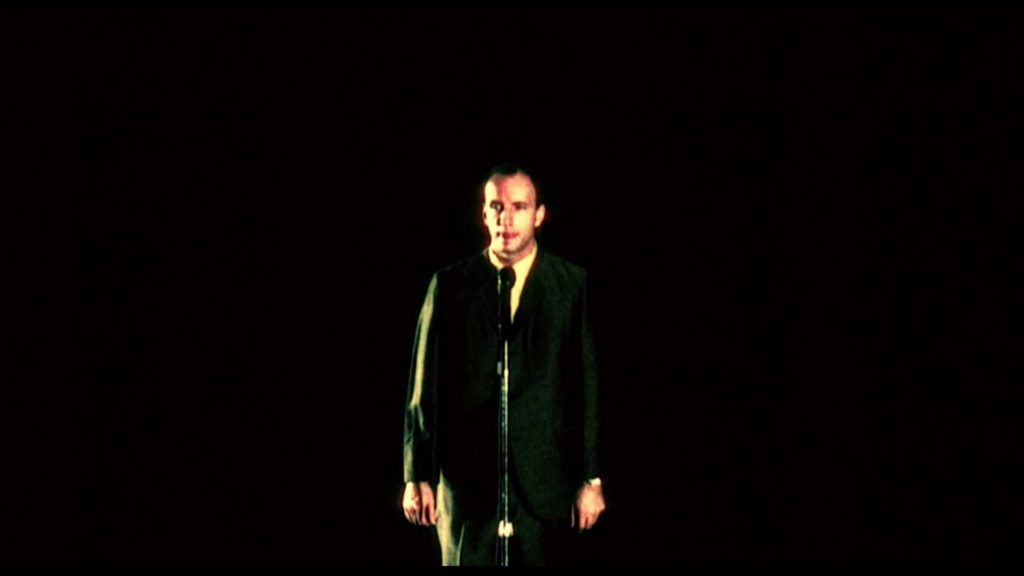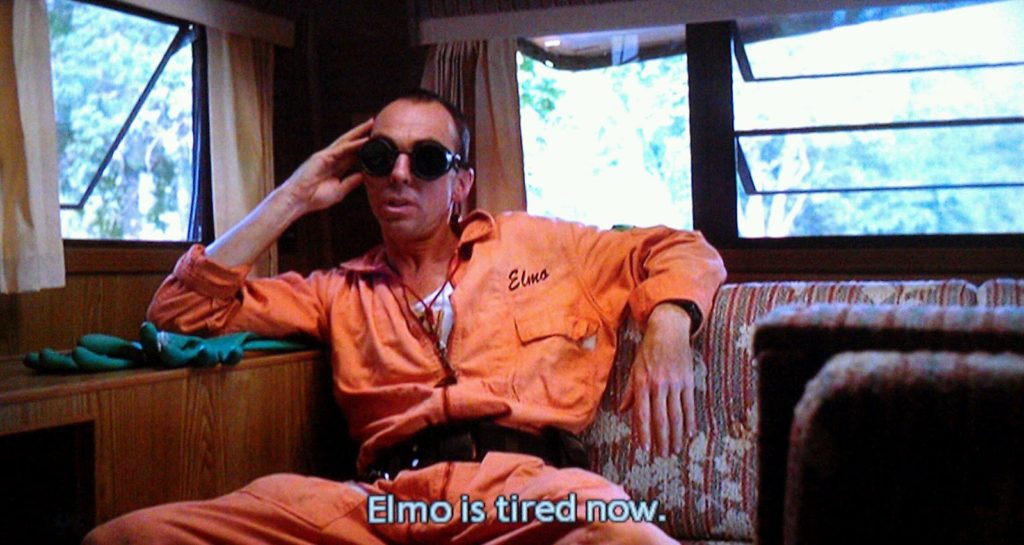A Look Back at Criterion’s DVD Debut of Soderbergh’s Weirdest Movie
In conjunction with our January 2017 edition of “Film Admissions”, which is devoted to director Steven Soderbergh, I’ve dug up my circa 2003 review of Critierion’s DVD release of his low-budget oddball movie, Schizopolis. If anything pushed the limit of what would, for a time, emerge as his “one for them, one for me” way of deciding on projects, it’s this film. Enjoy…
 DIRECTED BY STEVEN SODERBERGH/1996
DIRECTED BY STEVEN SODERBERGH/1996
STREET DATE: OCTOBER 28, 2003/THE CRITERION COLLECTION
Egads, where to start?? (How’s that for an opening line?) To the surprise of many attending the premiere showing of this film at that year’s Cannes Film Festival, critically lauded and established director Steven Soberbergh has created one nutty, self-indulgent, off-kilter movie. Made with seemingly nothing but pocket change and borrowed locations, Schizopolis is most accurately described as the director’s tribute to filmmaker Richard Lester’s seemingly freeform 1960s comedies like Help! and The Knack… And How to Get It. I say this with some trepidation, since the original video version of the film warned on the packaging: “All attempts at synopsizing the film have ended in failure and hospitalization.” Yikes – the risks I take for these things. But, continuing…
Fans of Richard Lester may like this movie, but there’s really no guarantee of that. Fans of the film’s director/writer/star Soderbergh may also like it, but there’s even less of a guarantee of that.
Apparently, no one in 1996 – the year of the film’s pathetically short and truncated release – expected a bizarre, experimental riff from the man who brought them sex, lies, and videotape, Kafka, and King of the Hill. I’d imagine that in recent years such unexpectations will have only grown, in light of Soderbergh’s expanding fame and prominence following his decidedly mainstream turns with Ocean’s Eleven, Erin Brockovich, Out of Sight, and Traffic, for which he snagged a Best Director Oscar. Schizopolis has managed to remain an unknown, hard-to-find curiosity since it’s release – that is until now, with the Criterion release of the DVD.

Fans of Richard Lester may like this movie, but there’s really no guarantee of that. Fans of the film’s director/writer/star Soderbergh may also like it, but there’s even less of a guarantee of that. It’s probably safest to say that people who enjoy quirky, offbeat, experimental films are the primary – and probably only – audience for this. Fortunately for me, I’m in that small crowd. After years of waiting to see this obscure left turn by one our greatest and most diversely talented directors, Criterion has delivered a winning package. Enough disclaimers – this movie is hilarious. From the moment Soderbergh intros his film in front of a curtained movie screen, ala Cecil B. DeMille, we know this is going to be a subversive, low budget romp.
At the start of the movie, two orderlies are seen chasing a naked man wearing only a t-shirt through a public park. The naked guy gets a hold of a bike, and off he goes. He zips passed the stoically refined Man Being Interviewed (yes, that’s his name), who is in fact about to be interviewed. It isn’t too long before we meet the first of Soderbergh’s two characters he plays in this film. This is Fletcher Munson, a miserable office drone who’s closest friend is fellow disgruntled office mate Nameless Numberhead Man (Eddie Jemison). Soon we see Munson quietly pleasuring himself in a public bathroom stall, then making crazy faces at himself in the mirror. Based upon these few vignettes, what exactly is Soderbergh telling us about the nature of this film? This being a family web site, I’m going to leave that guessing to you, but suffice it to say, the director’s inner inmate is free, and wreaking all kinds of cinematically inappropriate havoc.

From the eyes of the MPAA, the bathroom stall bit is about as “inappropriate” as this film gets, barring at least one overly revealing shot of the naked t-shirt guy. “Inappropriate” in this case carries a different usage than what we may be accustomed to in the case of movies. For starters, based on info found on the commentary tracks and the enclosed essay, Soderbergh is airing more of his life’s dirty laundry here than we may initially realize. For starters, his soon-to-be ex-wife (Betsy Brantley) is playing Munson’s wife who cheats on him with his other character, a dentist named Dr. Jeffery Korchek. Soderbergh has apparently had a lifetime of severe dental trauma, so that character’s profession is perhaps more significant than the usual psychological meanings associated with obsession over ones teeth.
In the meantime, characters switch places, same scenarios are told from different perspectives, and doppelgänger confusion (at least for the viewer) ensues. If you’ve seen David Lynch’s Lost Highway (interestingly, released around the same time), you’ve seen the serious version of this same material. Soberbergh’s take is always amusing, and most of the time successful. Quite often, the forth wall is broken, and the small crew is shown in the act of making the movie.
Upon its release, this film took a critical lashing for being too “self-indulgent”. Most critics often complain of the lack of art in film today. This was a classic example of good art being right in front of their noses, and them being unable to recognize it due to it’s comical face. It is this inability of the establishment to recognize comedy as a legitimate means of expression that keeps the genre stale and in the gutter. As Soderbergh’s newly recorded commentary (where-in he interviews himself about the film) attests, the man has a sharp and lively sense of humor. Maybe one day he’ll make a popular comedy, and shatter genre conventions, making the movie screen a fresher place for laugh-seekers the world over.
Besides the already mentioned thoroughly hilarious self-interviewing director’s commentary, there is another worthwhile commentary with members of the cast and crew. I was surprised to learn that many of these people are Soderbergh’s longtime friends, and that they continue to work with him on his big-budget Hollywood features, including the recent Solaris remake. There is also a reel of outtakes that might as well have been in the movie (“Maximum Busy Muscle”), and the theatrical trailer. On the flip side of the cover insert, there is a longwinded wacky rant that fills the entire sheet. The type is so small, I’m pretty sure I suffered some sort of eye damage from reading the whole thing, but it was so weird to discover this hidden non sequitur manifesto, I couldn’t resist.
Whoops, I almost forgot to mention the jab at L. Ron Hubbard’s Dianetics in the form of T. Azimuth Schwitters’ Eventualism, and the explanation-defying oddball character of Elmo Oxygen (Mike Malone and David Jensen, respectively). I really don’t know what to say about these guys other than that they are important, and their being mentioned is vital to this review. So there they are. I’ve covered everything I can without spoiling anything. I hope you want to see Schizopolis now. I actually want to watch it again. I’m going to do that. We’re done here.
Viewers should note: SCHIZOPOLIS contains adult themes, situations, language, and a naked man wearing only a t-shirt.

